Determination to Thrive
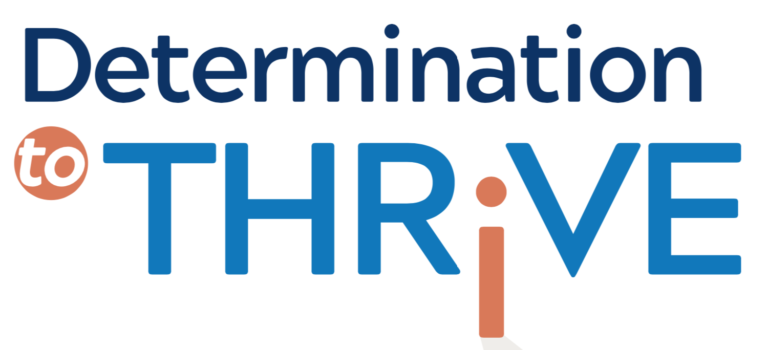
Carleigh LaVoy and dozens of other KU students fanned out through the exhibition “Visible and Divisible America” at the Spencer Museum of Art, exploring the works to identify which they personally related to the most.
She maneuvered her power wheelchair to view Twelve Drive-Ins I. Created by Jeff Brouws, the artwork comprises photographs of 12 drive-in theaters. Absent of people or cars, the drive-ins appear abandoned.
Flashing her broad, disarming smile and leaning slightly to the left in her chair, Carleigh raised her hand to be called on first.
“All the pieces of art look the same, but they are all different,” she said of Twelve Drive-Ins.
“Just like all of us.”
Her powerful observation captures the heart of Transition to Postsecondary Education (TPE), a KU program funded by a five-year federal grant in 2015 to include students with intellectual and developmental disabilities as full-fledged KU students. While its future is uncertain, TPE’s impact is not: By diversifying the student body, it has widened perspectives and challenged assumptions among students, faculty, families and, most important, TPE students themselves.
Amid the crush of students in the gallery last September, LaVoy was doing what she does every day, as she puts it, “proving that people in wheelchairs can do everything that other people can do.”
But a few years before, she and her parents had not imagined that she would apply to KU, attend classes on the Hill, perform with a KU choir or attend “Late Night in the Phog” with new friends. They did not envision that she would open doors for other students by advocating for her own independence on campus.
For her parents, the first few months of their daughter’s life were full of questions and uncertainties. Doctors confirmed she had endured a brain injury before birth, caused by a lack of oxygen at some point, but no one knew what impact that would have. Her mother, Carrie LaVoy, felt overwhelmed.
“We didn’t know if she was going to be able to talk because of the brain injury,” says Carrie, who teaches undergraduate and graduate courses at the KU School of Education and Human Sciences. “We had no idea. Is she ever going to be able to live on her own, or go to school?”
But early interventions with therapists revealed that Carleigh could engage with the world around her—once she could see it. After she received her first pair of glasses at 4 months old, she went from not looking at her parents or making any kind of connection to laughing, smiling and kicking away, her mother recalls.
Therapy led to preschool through the Children’s Center for the Visually Impaired in Kansas City, and then public school, culminating in her graduation from Olathe Northwest High School in 2019.
The LaVoys hadn’t talked much about what would happen next. Then a KU colleague mentioned TPE to Carrie and encouraged the family to apply to KU.
It seemed perfect. Carrie worked on campus, so her daughter could join her. They completed the application process and interviews and, like other families, waited anxiously for a reply.
A video captures Carleigh’s reaction when she opened her acceptance letter from the Office of Admissions in February 2019. She reads the letter aloud, emphasizing each word.
“The letter says, ‘Dear Carleigh. Congratulations! You are a Jayhawk!’” Carleigh beams at the camera. “Yeah! I got in!”
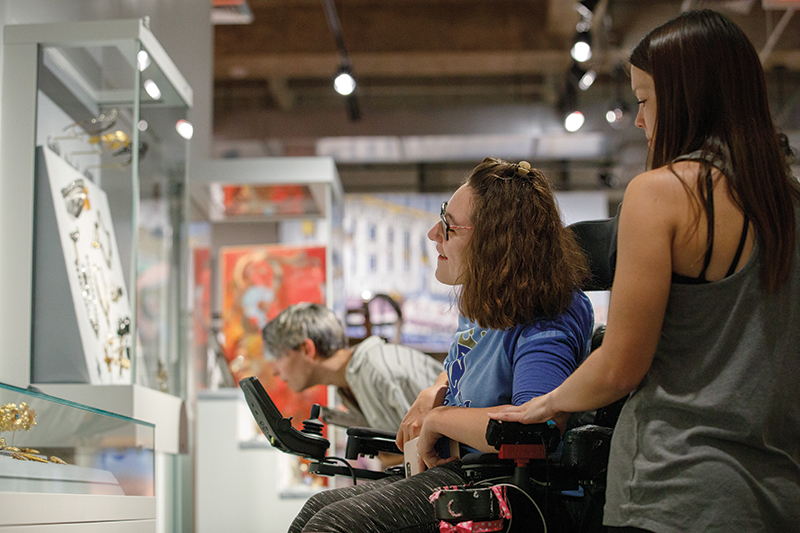
Countless KU students need many kinds of practical and academic support to succeed and graduate.
Transition to Postsecondary Education offers students with intellectual and developmental disabilities a combination of academic, career development and student-life experiences to build their independence and prepare them for integrated employment.
TPE students enroll in undergraduate courses, participate in student clubs and activities, can live in student housing, and gain career experience through student jobs and internships. They graduate in two years with Transition to Postsecondary Education Certificates from the School of Education and Human Sciences on their official KU transcripts.
The only program of its kind in the state, TPE differs from many of the other 300 programs for students with intellectual disabilities at colleges and universities nationwide, says Dana Lattin, research project director and administrator for the program. Some programs may be structured to isolate students with intellectual disabilities into a separate group; they may not be allowed to live in student housing or, if allowed, they are required to live with other students with intellectual disabilities in a separate wing.
Segregated programs reduce opportunities to experience diversity, says Karrie Shogren, primary investigator for the TPE grant and director of the Kansas University Center on Developmental Disabilities. “Individuals in those [other] programs don’t have peers to model,” she says. “They don’t get access to what it means to navigate around your community, to take risks, and to experience self-determination.”
That concept of providing individuals with intellectual and developmental disabilities more determination in how they live their lives is the culmination of six decades of research at the KU Life Span Institute. First led by Richard Schiefelbusch, g’47, distinguished professor emeritus of speech, language and hearing, its researchers have helped transform early practices. Individuals with intellectual disabilities, who years ago were isolated in long-term care facilities, now can benefit from early interventions that have improved their education, work, opportunities and overall quality of life.
TPE focuses on developing the skills students need to gain what is known among advocates as “competitive integrated employment” after graduation. That phrase describes the ideal standard: a job that is at least half-time, pays at least minimum wage—and integrates people with and without disabilities for a diverse workplace.
But today, 30 years after the passage of the Americans with Disabilities Act, a loophole in the law has allowed employers to pay people with intellectual and developmental disabilities far less than minimum wage. About 300,000 are employed in sub-minimum wage jobs, often in “sheltered workshops,” or places that exclusively employ people with intellectual disabilities for assembly or other repeated tasks.
Like the general population, individuals with disabilities will be better able to compete for jobs if they have college experiences and internships, Lattin says, noting that through 2019, 80% of TPE’s graduates had integrated employment or were continuing their education within 90 days after graduation, compared to 44% nationally in similar college programs.
“Our students are leaving KU with the skills not to change the oil or diaper a baby but with the communication skills, advocacy skills and the ability to clarify and make decisions—what we call 21st-century or soft skills—that get people much further,” Lattin says.
Of course, when COVID-19 forced the closure of campus in mid-March, Lattin and her TPE colleagues worked to overhaul in-person academic coaching, internships and peer mentoring to offer online alternatives. Their work continues this fall as students return to campus.
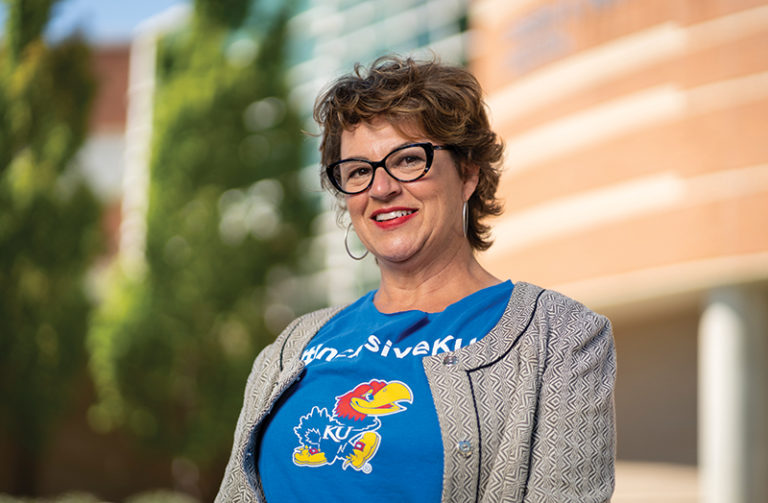
Study sessions at Watson Library sometimes dissolved into laughter as Carleigh LaVoy and KU senior and TPE academic coach Madisen Huscher, c’20, riffed on each other’s jokes.
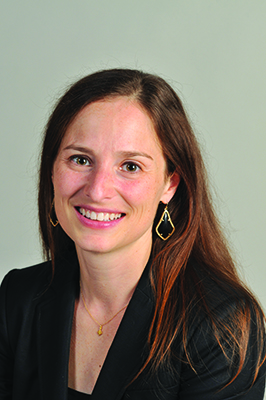
From Watson, the friends would head west on Jayhawk Boulevard and north on West Campus Road to Joseph R. Pearson Hall, home to the School of Education and Human Sciences and the third-floor office of LaVoy’s mother, Carrie. Along the way, Huscher, an academic coach for four semesters, witnessed her friend’s frustration with the square blue buttons that make campus buildings accessible. When pressed, the button automatically opens the door to allow a person inside.
“The push button for the doors makes them not stay open very long, and I cannot get through very fast,” LaVoy says. “People have to hold the doors open for me sometimes.”
She didn’t like asking for help from her personal assistants, friends or strangers. With Huscher’s support, she met in November with Catherine Johnson, director of KU ADA Resource Center for Equity and Accessibility.
“Carleigh was the one directing what she wanted and needed,” Huscher recalls. “We rehearsed what she was going to say beforehand sometimes so if there were needs that she had brought up to me, but forgot in the moment, I could bring those up.”
Johnson worked with staff and advocates to find a way for a person to operate the door without the fine motor control needed to press the blue button and keep it open. They settled on a small radio signal transmitter about the size and shape of a key fob that LaVoy could use to control the door from a few feet away and keep it open longer. She identified which buildings she frequented for class, for her internship, and student housing where she visited friends. KU staff planned for the device to be added to each door she needed.
The solution would help other students, too. “Carleigh told me that we can set the pace and be the first people to get this ready for future students who might need the services, so it doesn’t take them so long to get it figured out,” Huscher says.
To comply with its federal grant, TPE staff track the number of students participating in the program and their courses and internships, sharing that information with similar programs and the public. Dana Lattin would like to explore further to document students’ outlook on their quality of life, their self-determination and independence.
“We need more information about people with intellectual disabilities because the world thinks that they shouldn’t be here in a university setting,” she says.
The five-year federal grants for TPE and 63 other college and university programs funded creation and development, but to continue their work, directors must seek support from private, state or other resources.
At KU, the task has proved challenging, Lattin says. In addition to seeking other grants, she has championed TPE to parents, donors, KU administrators and students for four years. She is blunt about its future: Without funding, it will go away.
For now, there are some remaining grant funds that pay for administration, and each student pays fees on top of tuition that help fund the academic coaches, job development and other aspects of the program. A record nine new students from Kansas and Colorado have been admitted for fall 2020, joining LaVoy and another second-year student to make the largest group of TPE students in the program’s history. KU Endowment has created a crowdfunding campaign (launchku.org/tpe) to benefit the program.
Lattin is quick to point out that TPE benefits not only its students but also the larger community. “It’s breaking down that mentality that individuals with intellectual disabilities are less than, or they are child-like,” she says.
TPE students’ presence in classrooms, basketball games, choirs and other gatherings dispels those myths and demonstrates students’ potential to KU peers and faculty. Those circles widen further through internships in the Watkins Health Center pharmacy, Mrs. E’s dining hall, the campus greenhouse or, in LaVoy’s case, the Spencer Museum of Art.
Carleigh, who makes friends wherever she goes, says that in her first year at KU, she learned she can conquer anything—and even adapt to disruption brought on by the COVID-19 pandemic.
“I learned I can stay positive through anything,” she says. “I love it here, and TPE has done a great job, and when I graduate, I’m definitely going to come back to visit.”
When she considers why she easily connects with other people, she says, “It’s probably because I live a completely different life, and that since I’m in a wheelchair I prove that people in wheelchairs can do everything that other people can do, like going to basketball games or to Late Night in the Phog, my favorite.
“Just doing the things that regular people, like regular college students, do.”
—Humphrey, j’96, c’03, g’10, is director of external affairs at the KU Life Span Institute.
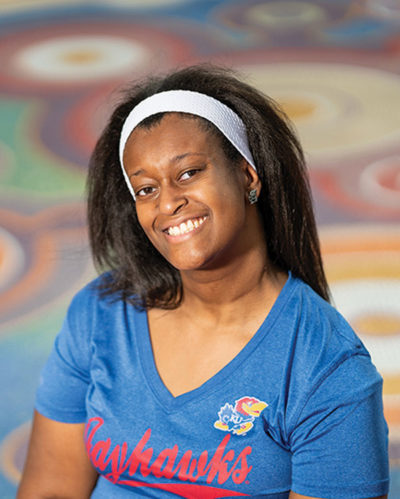
Kamerae Luster
Hometown: Spring Hill
Graduated: 2018
“The reason TPE was my favorite thing at KU [was] because my parents would always suggest things for me, and life skills allowed me to become more independent. I can make my own choices.”
Noah Krueger
Hometown: Lenexa
Graduated: 2019
“I learned living on my own, grocery shopping, budgeting, working and how to live with friends. I would recommend TPE because it gives the opportunity for [students] to live on their own, attend more events and activities, meet friends and find employment.”
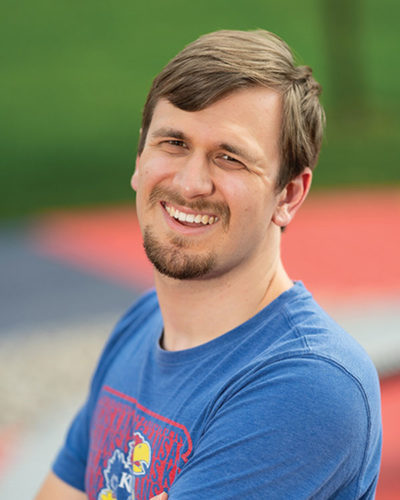
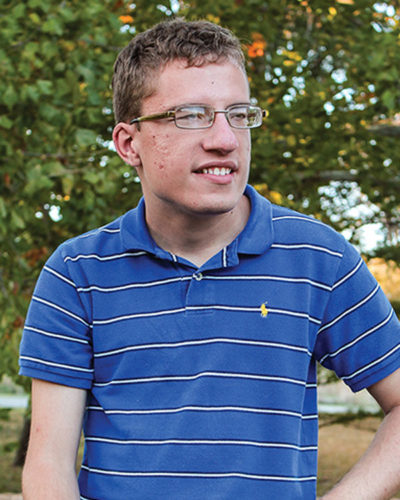
Jacob Hammer
Hometown: Lawrence
Graduated: 2020
“I didn’t think I could be a full-time student at a university. If someone has a disability and I knew them and they were worried about being a full-time student, I would tell them about TPE. It’s something you can put on your résumé, and help you get a full-time job because you have college experience.”